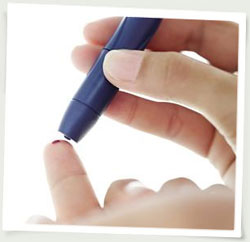
What is diabetes: Symptoms and risk factors
Posted in General Health on February 11, 2013. Last modified on April 25, 2019. Read disclaimer.
When we eat, our body turns most of the food into sugar (glucose) which then gets converted into energy with the help of the hormone, insulin. In people with diabetes, either the pancreas does not produce ANY insulin (known as type 1, insulin-dependent, or juvenile diabetes -- since it usually shows up in childhood); or the pancreas produces too little insulin plus the cells in the muscles, fat and liver are unable to utilize that insulin properly (known as type 2, adult or non-insulin dependent diabetes). 90-95% of people diagnosed with diabetes are type 2. This results in above normal blood sugar levels at the same time that the cells are being starved of energy.
+ Free Shipping & Returns on Eligible Items.
(*Amazon's Top 100 list updated hourly.)
Of the estimated that 1/3 of all Americans1 (or 100 million of us) who have type 2 diabetes or are prediabetic, 1/3 are not even aware of it. Unfortunately, 90% of type 2 diabetes could have been prevented by controlling lifestyle factors. So, why is diagnosis and treatment important? Because diabetics who fail to properly manage the disease (blood sugar levels above 100 mg/dL) live an average of 6 years less than nondiabetics2!
Symptoms of diabetes
Many people with diabetes exhibit no symptoms for 10-15 years. Possible signs to be aware of, however, can include:
- excessive thirst
- frequent need to urinate
- weight loss
- extreme hunger
- constant fatigue
- tingling or numbness in the hands or feet
- sores that heal slowly
- dry skin
- frequent infections
In addition, a simple blood test is suggested for anyone who has one or more of the following diabetes-risk factors.
Diabetes risk factors
- have a parent or sibling with diabetes
- are overweight
- are of Pacific Islander or African, Asian, Hispanic or Native American descent
- have given birth to a baby weighing over 9 lbs. or history of gestational diabetes
- have been diagnosed with high cholesterol levels, high blood pressure or heart disease
- women who have polycystic ovarian syndrome
- do not exercise at least three times per week and live a fairly sedentary lifestyle
- age 45 or over. In fact, most newly diagnosed diabetics are the 45-55 age group.
Unfortunately, there is no cure for diabetes at this time. And left untreated, diabetes can lead to heart and kidney disease, stroke, blindness, nerve damage, gum infection, amputation and more. In fact, diabetes is the 7th leading cause of death in the United States. The good news, on the other hand, is that a person with diabetes who is diagnosed early and takes care of him or herself has a good chance of living a full, healthy life.
What is prediabetes?
Also known as insulin resistance, prediabetes is condition where your cells have begun to ignore insulin, leaving blood sugar to sit in the bloodstream. Responding to this perceived "need" by the cells, our pancreas produces even more insulin until, eventually, the pancreas becomes weakened and blood sugar levels soars. Fortunately, lifestyle changes can often prevent prediabetes from progressing into full-blown diabetes.
Lifestyle recommendations for managing prediabetes and diabetes
A self-care plan for managing diabetes includes:
- controlling your weight. (If your waist measures more than 35" for women or 40" for men, you are at high risk for developing diabetes1.)
- eating a healthy diet that is high in fruits, vegetables, fish, chicken, turkey or other lean meats, beans, high-fiber whole-grains and low-fat dairy products. Limit your intake of fatty foods, salt, refined carbohydrates and, according to at least one study, sodas.
- exercising 30-60 minutes most days -- even if this is just a brisk walk.
- learning how to manage stress
- not smoking
- monitoring blood glucose, blood pressure and cholesterol levels
- taking prescribed medication -- even when you are feeling good.
- practicing good dental hygiene
- being on the lookout for foot problems or vision changes

Low Vitamin D levels linked to diabetes risk
Melbourne, Australia - Low Vitamin D levels are associated with type 2 diabetes risk, that's according to a study published in Diabetes Care. Scientists from the University of Melbourne in Australia found that people with lower than average Vitamin D levels had a 57% higher chance of developing diabetes than people with Vitamin D levels.
Researchers measured Vitamin D levels in over 5,000 people without diabetes. After five years, researchers measured Vitamin D levels again and determined that 200 of the participants had developed diabetes. They found that 6 in 100 people with low Vitamin D levels developed diabetes, versus 3 in 100 with regular levels that developed diabetes. When they factored in diabetes risk factors, the risk of diabetes increased to 57%.
Sources (Accessed February 11, 2013)
1. Prevention magazine, January 2013, Let's Outsmart Diabetes
CDC Diabetes Fact Sheet
2. New England Journal of Medicine. 2011; 364:829-41

 Childrens health mini-quiz
Childrens health mini-quiz Where has all my energy gone?!
Where has all my energy gone?! Importance of eating probiotics
Importance of eating probiotics Diabetes causes & management
Diabetes causes & management 15 Tips for getting refreshing sleep
15 Tips for getting refreshing sleep How sweets effect health and aging
How sweets effect health and aging CDC's recommended vaccinations
CDC's recommended vaccinations Natural flea control for pets
Natural flea control for pets Guide to composting scraps
Guide to composting scraps Tips for early vegetable gardening
Tips for early vegetable gardening